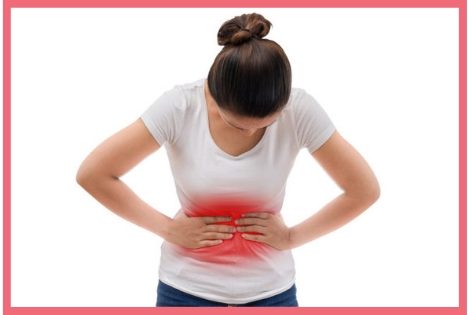While Crohn’s disease cannot yet be cured, it can be managed successfully and can remain in remission for long periods of time.
The foods that you put into your body can have an impact on the severity of your Crohn’s symptoms. People with Crohn’s identify various foods as triggers and at Nutrition for Life Healthcare we help people to manage Crohn’s better understand their triggers as well as teach them about gut health & anti-inflammatory foods.
What is Crohn’s disease?
A chronic inflammatory bowel disease affecting the lining of the digestive tract.
What is the cause of this disease?
The cause of Crohn’s disease is unknown. However, it is likely due to an abnormal response of the immune system. Food or bacteria in the intestines, or even the lining of the bowel may cause the uncontrolled inflammation associated with Crohn’s disease. It is common for many people to live with Crohn’s and not yet be diagnosed!
Symptoms of Crohn’s disease include;
Abdominal Pain
Abdominal pain may be one of the first symptoms of Crohn’s disease. As the intestines become inflamed and irritated, the bowels send pain signals to the brain. If the disease is at a progressed level then ulcers will form and pain may be felt upon food consumption.

A Low Carbohydrate Health Fat approach can significantly reduce symptoms of Crohn’s Disease.
Cramping
In severe Crohn’s disease sufferers, painful cramping may be common. As the disease progresses, scar tissue can form around the intestines. As the person eats and the intestines shift, the scar tissue can pull. This can cause incredibly painful cramping.
Diarrhoea
When Crohn’s disease affects the intestines, it causes them to pump out water and electrolytes. This mixes with the stools, causing diarrhoea. If the large intestine is affected, diarrhoea may be small in quantity but affect the sufferer numerous times a day.
A Bloody Stool
Bloody stools are a disconcerting symptom of Crohn’s disease. As the inflammation of the bowels cause ulcers, blood may mix with the stool.
Frequent Defecation
With chronic diarrhoea, a Crohn’s disease sufferer may experience very frequent defecation. It may be upwards of 20 times a day.
Weight Loss
Crohn’s disease can affect the growth of children who are affected. Crohn’s can cause nutrient malabsorption, which can stunt the growth of young individuals if manifested before puberty. On an adult, Crohn’s disease can also cause weight loss.
Gallstones
Crohn’s disease may affect the ileum, which is the last part of the small intestine. Its function is to absorb both the vitamin B12 and the bile salts. When Crohn’s disease affects this, the bile salts are not absorbed and thus are excreted. The gallbladder then has an unbalanced ratio of cholesterol to bile, causing distress and eventually gallstones. A gallstone attack is very painful, resembling the symptoms of a heart attack.
DVT
Crohn’s disease may manifest in the skin of an affected individual. It can cause blood clots, resulting in deep venous thrombosis.
please note: If you are experiencing any one or more of the above symptoms, consult your GP in the first instance.
Key tips to managing Crohn’s disease;
There are varying degrees of severity for those who have Crohn’s, however the most important action anyone can take to help them manage Crohn’s is by leading a healthy lifestyle this includes nourishing yourself with a healthy diet. Healthy eating can significantly help you manage your Crohn’s…
One of the key nutritional actions to take is understanding what foods and drinks will trigger a “flare-up” and eliminating these from your diet.
You may also like to consider some direction to try eliminating processed carbohydrates and sugars – start learning – here
What to change in your diet to help you manage Crohn’s?
Please note: these are suggestions and not personalised advice. If you want a plan unique to your situation under the safe guidance of our team and your GP then contact us here.
Here are some of our suggestions if you are wanting to better manage crohn’s.
Eat smaller meals – Reduce meal size and aim for nutrient dense foods. See this plate example
Drink water – stay hydrated! This doesn’t mean you ‘skull water’ but rather, take regular sips of water throughout your day. Water assists in overall functioning and health.
Avoid high-fiber foods such as whole-wheat pasta or bread, beans, and other legumes like chickpeas and lentils, can cause diarrhoea and bloating during flares.
Minimise nuts, seeds, and popcorn – These foods can be especially difficult to digest, causing irritation in the digestive tract.
Minimise raw fruits and raw vegetables, and their cooked skins. You may have an easier time digesting cooked and peeled vegetables.
Avoid prunes – While prunes may help with regular digestion in people without inflammation in their bowel, they can cause problems in people with Crohn’s disease.
Avoid unhealthy fats! This will set off inflammation – see “healthy fats” – Free eBook here
Minimise spicy foods – Hot and spicy foods ‘may’ contain chemicals that can irritate your digestive system and worsen symptoms.
Limit dairy products – Some people with Crohn’s disease have problems digesting lactose – If you’re not lactose-intolerant, though, keep in mind that dairy products can be an important source of protein and calcium.
Reduce caffeine intake – Caffeine in coffee, tea, or soda can stimulate the bowel and worsen flare-ups.
Limit alcoholic beverages – Alcohol can irritate your bowel, so it’s important to figure out how much you can drink without having worsened symptoms.
Reduce carbonated beverages – In some people, “fizzy” drinks can make digestive symptoms worse.
If you are considering altering your diet, we recommend that you do so under the guidance of a qualified dietitian. And in taking on our suggestions consult with us to see if this will be the most beneficial individual plan for you.
Need help managing Crohn’s – We can help you. Contact us here
Thanks for Sharing!




